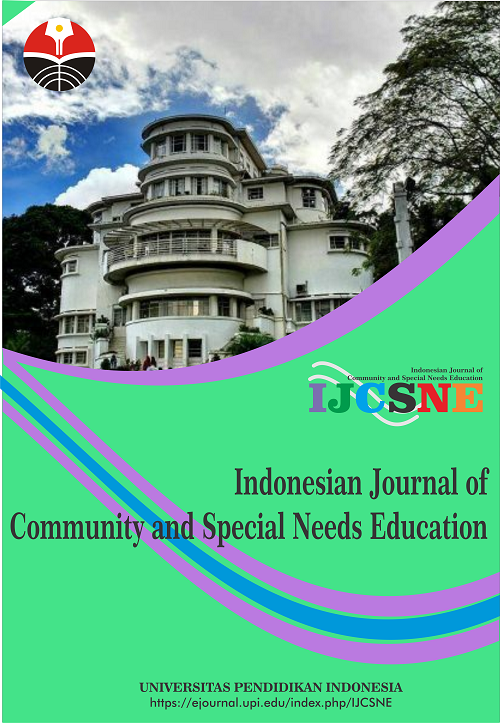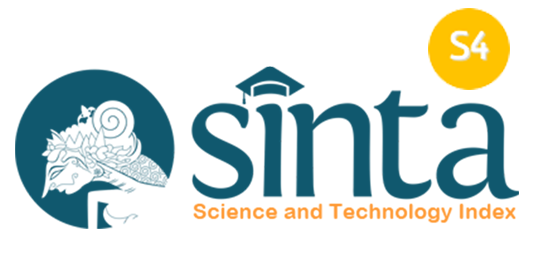Availability and Challenges of Inclusive Lower Primary Education Schools
Abstract
Keywords
Full Text:
PDFReferences
Adetoro, R. A. (2014). Inclusive education in Nigeria—A Myth or reality?. Creative Education, 5(20), 1777.
Akinyi, E., Onyango, E.N., and Orodho, J.A. (2015). Challenges facing implementation of inclusive education in public secondary schools in Rongo Sub-County, Migori County, Kenya. Journal of Humanities and Social Science, 20 (40), 39-50.
Egbedeyi, T. F. (2020). Teachers knowledge of inclusive lower primary education in Ifako-ijaiye local government area of Lagos State, Nigeria. International Journal of Emerging Issues in Early Childhood Education, 2(2), 116-126.
Etor, C. R., Mbon, U. F., and Ekanem, E. E. (2013). Primary Education as a Foundation for Qualitative Higher Education in Nigeria. Journal of Education and Learning, 2(2), 155-164.
Faddillah, R.N., Nandiyanto, A.B.D., and Bilad, M.R. (2022) Literacy program for elementary school students about inclusive education in recognizing children with special needs. ASEAN Journal of Community and Special Needs Education, 1(1), 1-8.
Fakolade, O. A., Adeniyi, S. O., and Tella, A. (2009). Attitude of teachers towards the inclusion of special needs children in general education classroom: The case of teachers in some selected schools in Nigeria. International Electronic Journal of elementary education, 1(3), 155-169.
Garuba, A. (2003). Inclusive education in the 21st century: Challenges and opportunities for Nigeria. Asia pacific disability rehabilitation journal, 14(2), 191-200.
Hamzat, I. R., and Morenikeji, A. B. (2019). Primary school teachers' awareness of girl child education as a panacea for achieving sustainable development goals. Journal of Early Childhood Association of Nigeria, 8(1), 294-307.
Kamble, A. D. K., and Gaikwad, H. V. (2021). How should the education system approach children with special needs?. Indonesian Journal of Community and Special Needs Education, 1(1), 15-18.
Maulida, E. (2019). Lesson of inclusive education implementation in Jakarta: availability and accessibility issues. Education Quarterly Reviews, 2(1), 172-184.
Odebiyi, O. M. (2016). Introduction of inclusive early childhood education curriculum in Nigerian school system: Do teachers’ perception, willingness and demography matter. International Journal of Education and Research, 4(5), 309-320.
Okongo, R. B., Ngao, G., Rop, N. K., and Nyonges, W. J. (2015). Effect of availability of teaching and learning resources on the implementation of Inclusive education in pre-School Centers in Nyamira North Sub-County, Nyamira County, Kenya. Journal of Education and Practice, 6(35), 132-141.
Olufunke, A. M., and Oluremi, O. F. (2014). Inclusive education and the development of Nigerian communities. International Journal of Academic Research in Progressive Education and Development, 3(1), 28-40.
Palma, M. C., Escucha, T. N. V., Distor, Z. B., Tuyao, B. V., Malaco, A., and Estrellan, J. (2021). Parental academic support in online and modular learners amidst pandemic: A comparative study. Indonesian Journal of Community and Special Needs Education, 1(1), 31-36.
Rahmat, A. (2021). Standards for dimensions of space and environment in buildings for people with special needs (i.e. Wheelchairs, crutches, canes for the visually impaired). Indonesian Journal of Community and Special Needs Education, 1(1), 19-24.
Salami, I. A and Egbedeyi, T. F. (2018). Inclusive lower primary education: parents' awareness of the economic and social benefits. Journal of Positive Psychology Counselling, 2(1), 33-45.
Salami, I. A. (2013). Inclusive early childhood education in Nigeria: the journey so far. The Journal of International Association of Special Education, 15(2): 118-126.
DOI: https://doi.org/10.17509/ijcsne.v3i2.54194
Refbacks
- There are currently no refbacks.
Copyright (c) 2023 Universitas Pendidikan Indonesia

This work is licensed under a Creative Commons Attribution-ShareAlike 4.0 International License.















